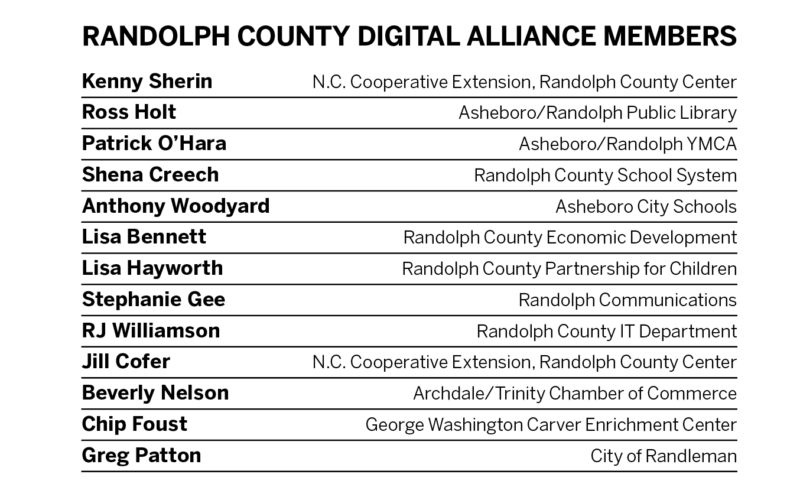ASHEBORO — In the coming weeks, you may be hearing from or seeing Randolph County’s Digital Ambassador. The N.C. Cooperative Extension office in Randolph County recently received a grant from the BAND-NC program which will allow the Randolph County Digital Alliance to hire a Digital Ambassador. The Randolph County Digital Alliance is a group who is working to close the digital divide in Randolph County. BAND-NC is a grant program designed to increase the number of people with internet in their homes, with the goal of making the state “first in digital inclusion.”
In February of this year, Randolph County received an initial grant of $5,000 from the same group to assist in the purchase of laptops for the Randolph County School System, Randolph County Public Library, and Randolph-Asheboro YMCA.
The Randolph County School System conducted a recent survey to prepare for the 2020-2021 school year showing eight percent of students did not have broadband access in their home and 34% of students lacked appropriate devices to access digital learning resources for remote learning.
North Carolina has some of the best overall internet connectivity rates in the Southeast, but some areas still have no internet access at broadband-speed levels, according to the Federal Communications Commission. The N.C. General Assembly passed the GREAT Act to provide $30 million in federal CARES Act funding to expand rural broadband access.
Rural households are especially impacted by the digital divide. Across the country, rural residence are 12 percent less likely to have a broadband connection than the American population as a whole. Of the students across the country who don’t have a reliable high-speed internet connection, 37 percent of them live in rural communities.
In North Carolina, political leaders have been highlighting the digital divide for years. According to a report by the Center of Public Education, approximately 568,000 students in North Carolina are from rural areas, making up 39.4 percent of the total student body. North Carolina has the second highest rural student population in the country after Texas. Over 75,000 students in North Carolina live in rural areas where internet providers have not even installed the lines needed for a high-speed internet connection. Even if households in these areas were able to afford a high-speed internet service, they would not have access to do so. Some rural communities also are not adequately covered by cell phone coverage, limiting the possibility to use smartphones to access the internet.
The Randolph County Digital Alliance hopes that every household and business in Randolph County will have access to needed digital resources. The 13-member group includes stakeholders from around the county.
The Digital Ambassador will be charged with sharing resources that may help people get better internet and understanding connectivity issues in Randolph County. The ambassador will be available to speak to community and civic groups about the digital inclusion plan for Randolph County. The group, through this new program, will identify locations where broadband is needed with an eye toward finding sources to fund new access.
The Digital Ambassador will also promote the FCC Emergency Broadband Benefit program to underserved communities and provide assistance in signing up for the benefit in Randolph County.

